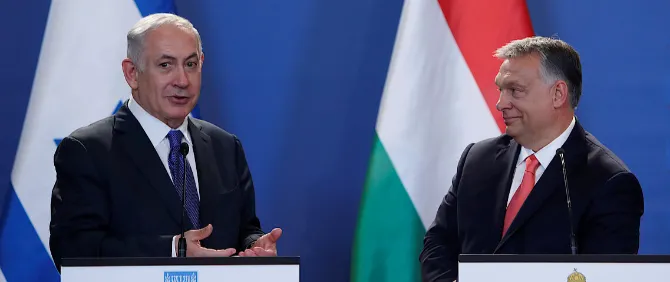
The recent response of an outright condemnation of the Hamas attack by the European Union (EU) is one of the first decisions that have had consensus in the European Parliament on Israel. In the past, support for Israel in the EU has not been uniform across time and space. Two decades ago, in a poll, 59 percent of Europeans agreed that Israel was the biggest threat to World peace. The EU has condemned the illegal Israeli settlements and attacks in the past. The EU policy towards Israel has been mixed; however, there are outliers within the EU: the Central and Eastern European nations such as Austria, Czech Republic, Hungary, Croatia, and Slovakia—whose relations with Israel are far warmer, so much so that they often deflect the EU stance. This October, four EU nations, Austria, Hungary, the Czech Republic, and Croatia voted against the UN resolution for a humanitarian ceasefire in the Gaza Strip. Therefore, the question emerges as to why some EU nations favour Israel more than others, and why is that most of the nations that favour Tel Aviv are situated in Central and Eastern Europe.
Shared histories
Historically speaking, there are various factors contributing to the support of Israel by nations in Central and Eastern Europe. Before 1882, a significant proportion of the global Jewish population, approximately 80 percent, resided in the Czarist Russian Empire and the Hapsburg Austro-Hungarian Empire. These empires inherited the majority of the Jewish population from the Polish Lithuanian Commonwealth after its partition, encompassing Polish crown lands, Lithuania, Belorussia (present-day Belarus), and Ukraine. Additionally, Jewish communities in Moravia, Bohemia, Hungary, and Slovakia were under Hapsburg rule. During this time, the Jewish population in the region lived on the fault lines of Eastern and Central Europe, witnessing a period of transformation within Judaism due to the convergence of Judaism and modernity. This convergence led to the revival of the Hebrew language as a literary medium. Consequently, the cultural symbols of Israel can be traced back to the socio-cultural developments in Eastern and Central Europe during this transformative period.
Even the ideological basis of Israeli right and left-wing political parties can be traced to the political developments in Eastern and Central Europe: Israeli Labour leaders like David Ben Gurion were immersed in debates between the Social Democrats and nardoniks, several leaders such as Dov Der Borochev synthesised zionism with socialism, although he never emigrated to Israel, his ideas are ontologically relevant in the politics of the Israeli left. In the case of Israeli rights, leaders born in Poland were strongly influenced by the instability and ethnic divisions that Poland was undergoing during the interwar period. Menachem Begin’s Irgun Zvai Leumi was inspired by Pilsudski’s National Democratic Party. Hence as Shlomo Avineri rightfully pointed out, while Israel is in the Middle East, the politics is often East European.
At present, the relations between Israel and the Central and Eastern European nations are not wholly influenced by shared history alone. These countries share similar conservative values and have authoritarian structures and populist leaders (apart from the Czech Republic), and a lack of democratic consensus which enable nations to pursue conducive ties with Israel. The Visegrad 4 shares the EU stance on the two-state solution, however, these nations are aligned with Israel on issues such as migration, security, and threat perceptions, which are all disputed in the EU. The shared common interests have evolved due to the changing geopolitical dynamics in the Middle East, since 2011, when instability in the Middle East triggered by the Arab Spring and the Syrian Civil War saw a vast influx of migrants and refugees flocking to the borders of the EU. Naturally, the Central and Eastern European nations were against granting asylum to refugees in their nations. These nations have an aversion to migration from Arab countries and empathize with Israel on the lines of having similar conservative beliefs and values. Therefore, Israel uses these nations to soften the pressure that comes from Brussels. In 2018, the Czech Republic, Romania, and Hungary blocked an EU statement criticising the US over its plan to move its embassy to Jerusalem. Despite reports of Hungary considering moving its embassy to Jerusalem, the Hungarian Ministry of Foreign Affairs has denied it. Recently, Czech Prime Minister Petr Fiala stated that the Czech Republic may move its embassy to Jerusalem in a matter of months. Thus, it wasn’t surprising when PM Netanyahu greeted President Orbán as the ‘true friend of Israel’.
The American angle
Israel becomes a critical variable in generating legitimacy from the US.
This is a win-win situation for both Israel and the Central and Eastern European states because Central European nations in turn benefit from trade with Israel and gain more legitimacy from the US. For Central and Eastern European nations, the only way to get an invitation from the White House is to either buy large quantities of American military equipment or PM Netanyahu should lobby for the visit. Under the Trump administration, the populist states in Central and Eastern European nations had cordial relations. However, the Biden administration, which is in the hopes of reversing the democratic backsliding, threatens the interests of Central and Eastern European nations. For instance, Hungary came under the scrutiny of the US Treasury Department as the Office of Foreign Assets Control (OFAC) sanctioned Hungary for its participation in the Russia-controlled International Investment Bank (IIB) which Hungary later left. This is why to sustain its national interests; Israel becomes a critical variable in generating legitimacy from the US. This is among the major reasons why we observe Central and Eastern European nations not condemning Israeli actions.
This is a win-win situation for both Israel and the Central and Eastern European states because Central European nations in turn benefit from trade with Israel and gain more legitimacy from the US.
Increasing diplomatic heft
The recent development of the discovery of natural gas in the Levantine Basin in the Eastern Mediterranean region, and Israel’s support for Greece, Cyprus, and, Egypt against the Türkiyé’s claim of the Levantine Basin for the extraction of natural gas by extending Northern Cyprus’s maritime boundaries; its proactive stance in the politics of the Euro-Mediterranean region, and easing relations in the Middle East through the signing of Abraham Accords has increased Israel’s diplomatic bandwidth, and bargaining capabilities in the international system. Thus, Central and Eastern European countries have hedged their bets with Israel, creating a further rift in the EU on the Israel-Palestine conflict.
Rajoli Siddharth Jayaprakash is a Research Intern at the Observer Research Foundation
The views expressed above belong to the author(s). ORF research and analyses now available on Telegram! Click here to access our curated content — blogs, longforms and interviews.




 PREV
PREV


